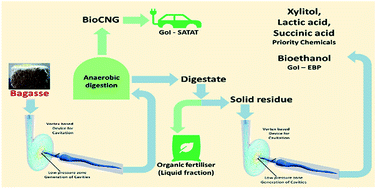Sugarcane bagasse based biorefineries in India: potential and challenges
Abstract
Sugarcane bagasse (SCB) is one of the world's most abundant agricultural residues and in an Indian context, ∼100 million tonnes per annum is produced. The current use of SCB is restricted to the cogeneration of steam and power; however considering its potential, cogeneration is not the best valorisation route. Furthermore, with falling electricity prices and reducing global sugar prices due to excess sugar stock, it is inevitable that the waste generated (SCB) by sugar mills are utilised for generating revenue sustainably. With this background, this review aims to put forth a biorefinery perspective based on SCB feedstock. Biogas and bioethanol are the Government of India's current focus with policies and subsidies clearly pointing towards a sizeable future market. Therefore, alongside these biofuels, high-value chemicals such as xylitol, succinic acid and lactic acid were identified as other desired products for biorefineries. This review firstly discusses SCB pre-treatment options based on end applications (saccharification or anaerobic digestion, AD). Next, state-of-the-art for each of these aspects was reviewed and our perspective on a profitable biorefinery is presented. We propose an AD based biorefinery where vortex-based hydrodynamic cavitation was found to be the best choice for pre-treatment. AD is considered not only a bioprocess for energy production here but also a ‘pre-treatment’, where partial conversion of holocellulose leads to a digestate rich in a loosened fibre matrix. This digestate rich in cellulose can be enzymatically hydrolysed and further valorised biochemically. This approach would be cost effective and provide a sustainable waste management route for sugar mills.

- This article is part of the themed collection: Sustainable Energy and Fuels Recent Review Articles


 Please wait while we load your content...
Please wait while we load your content...